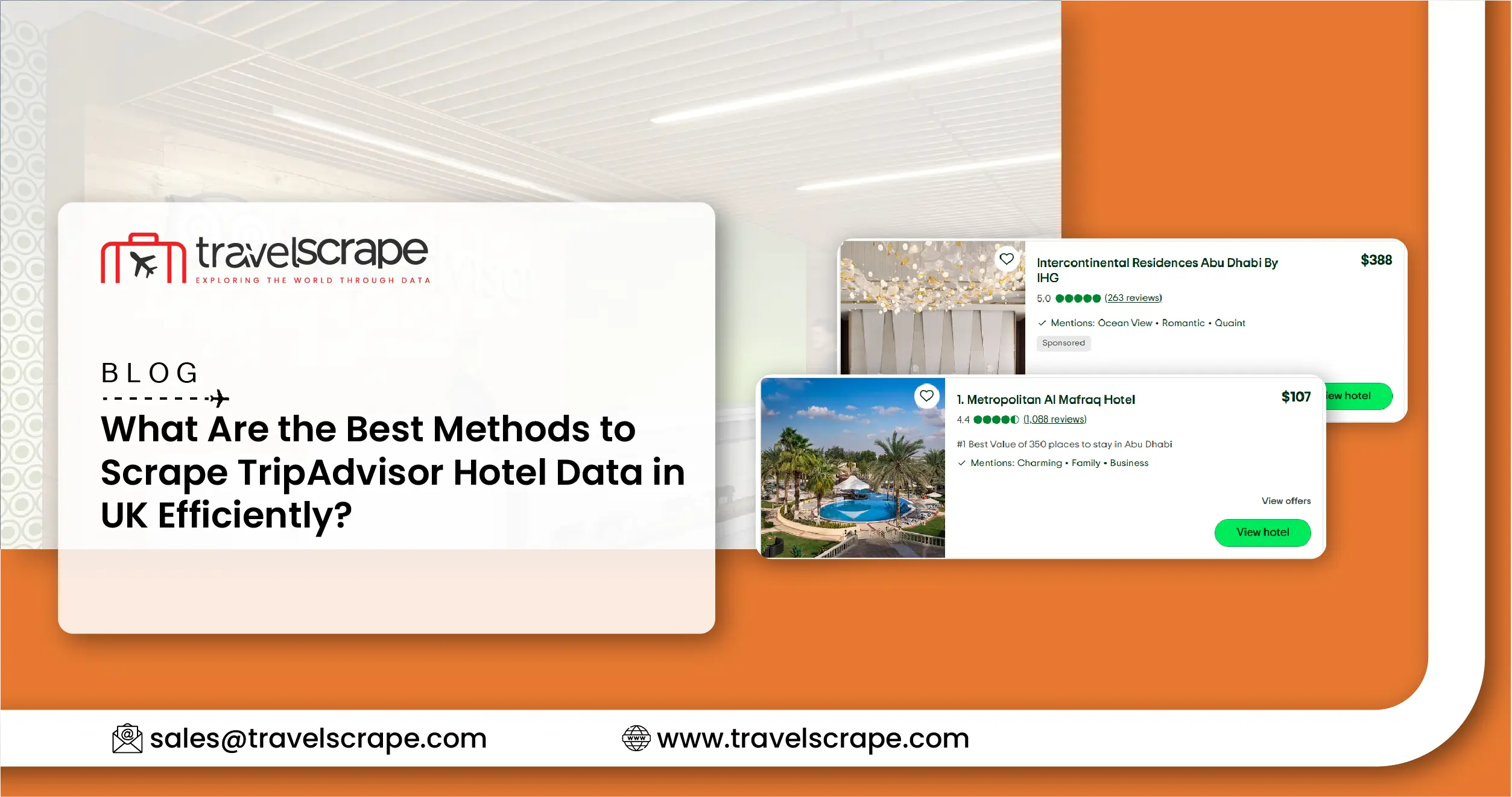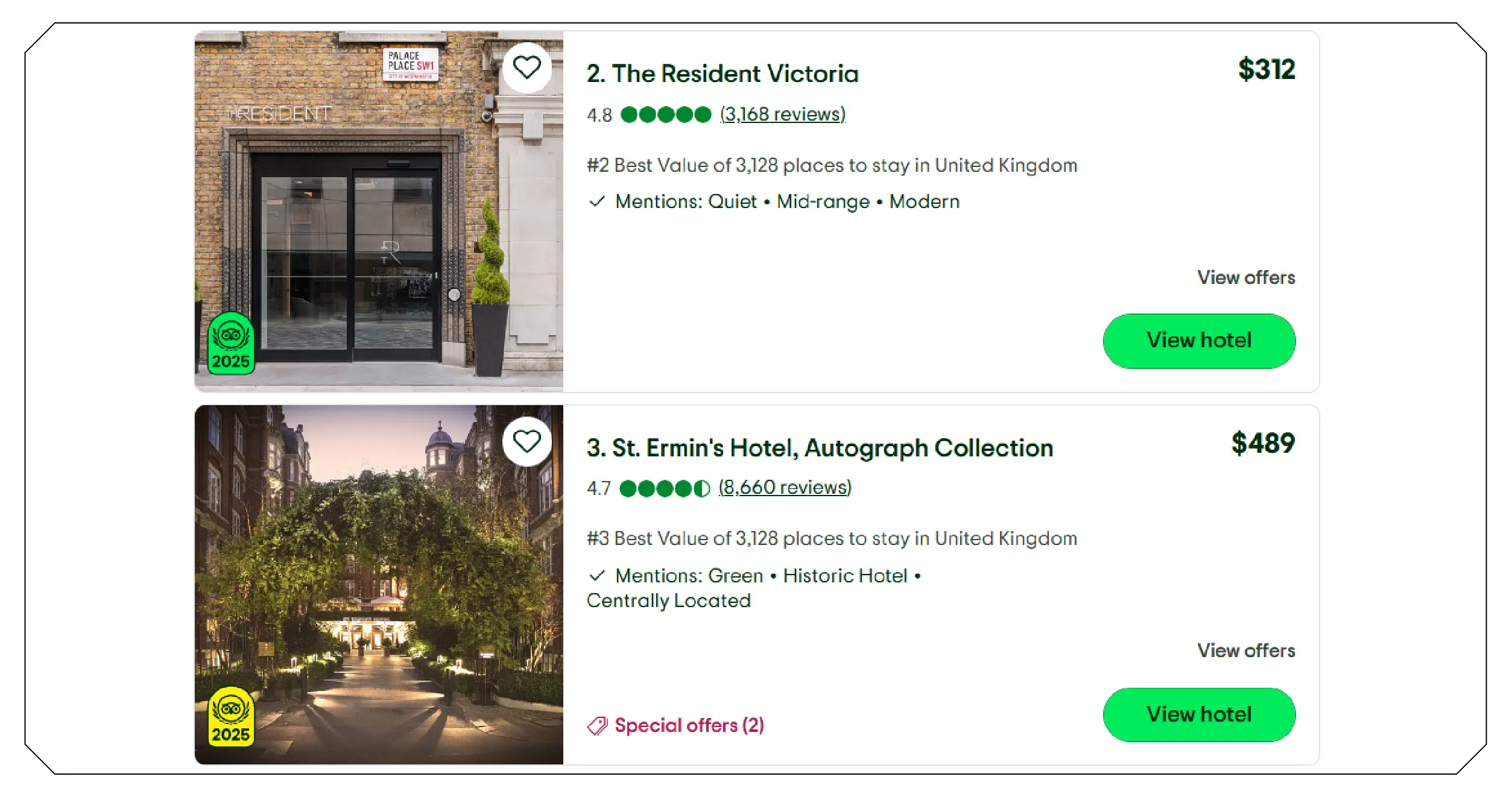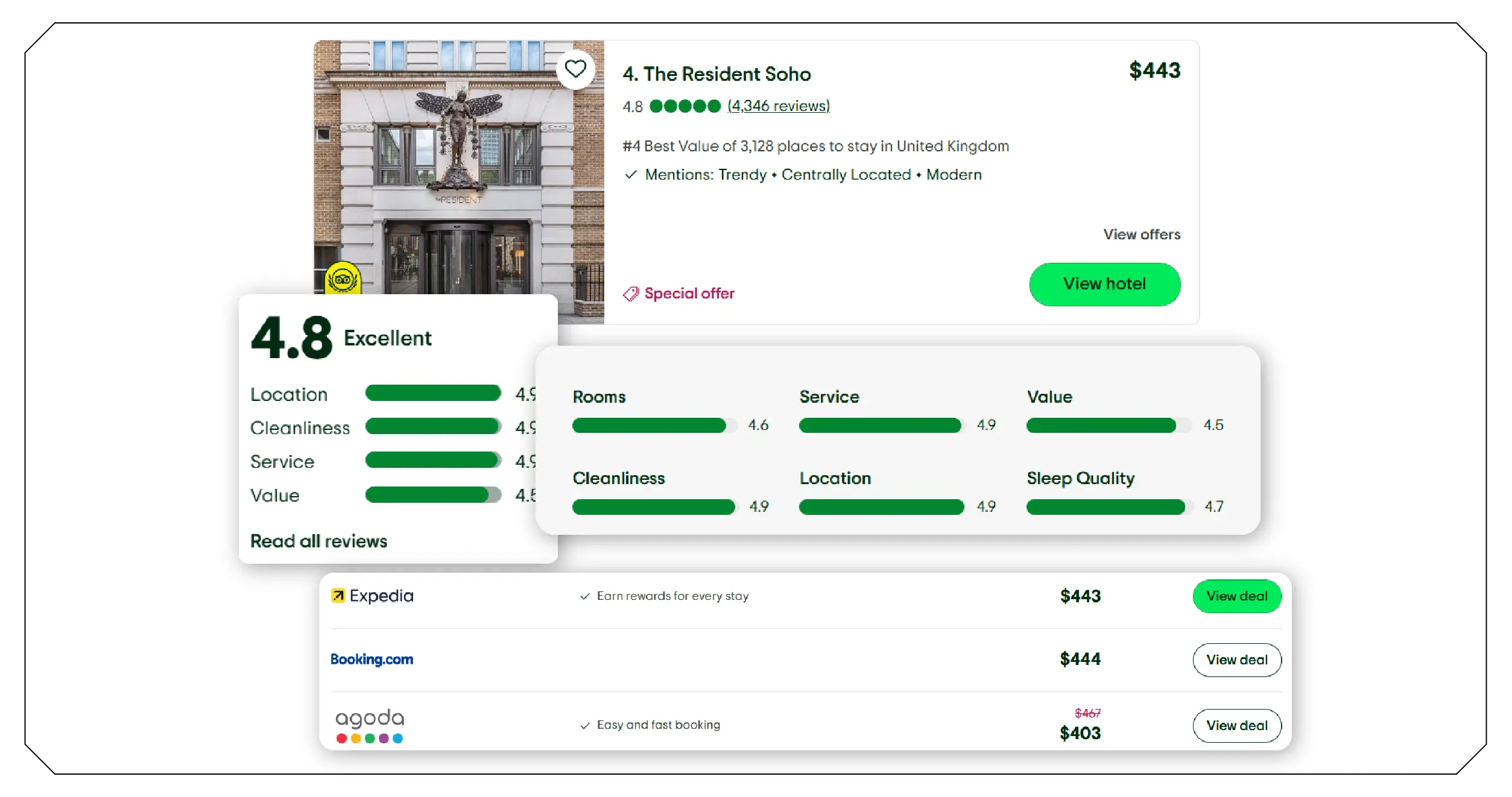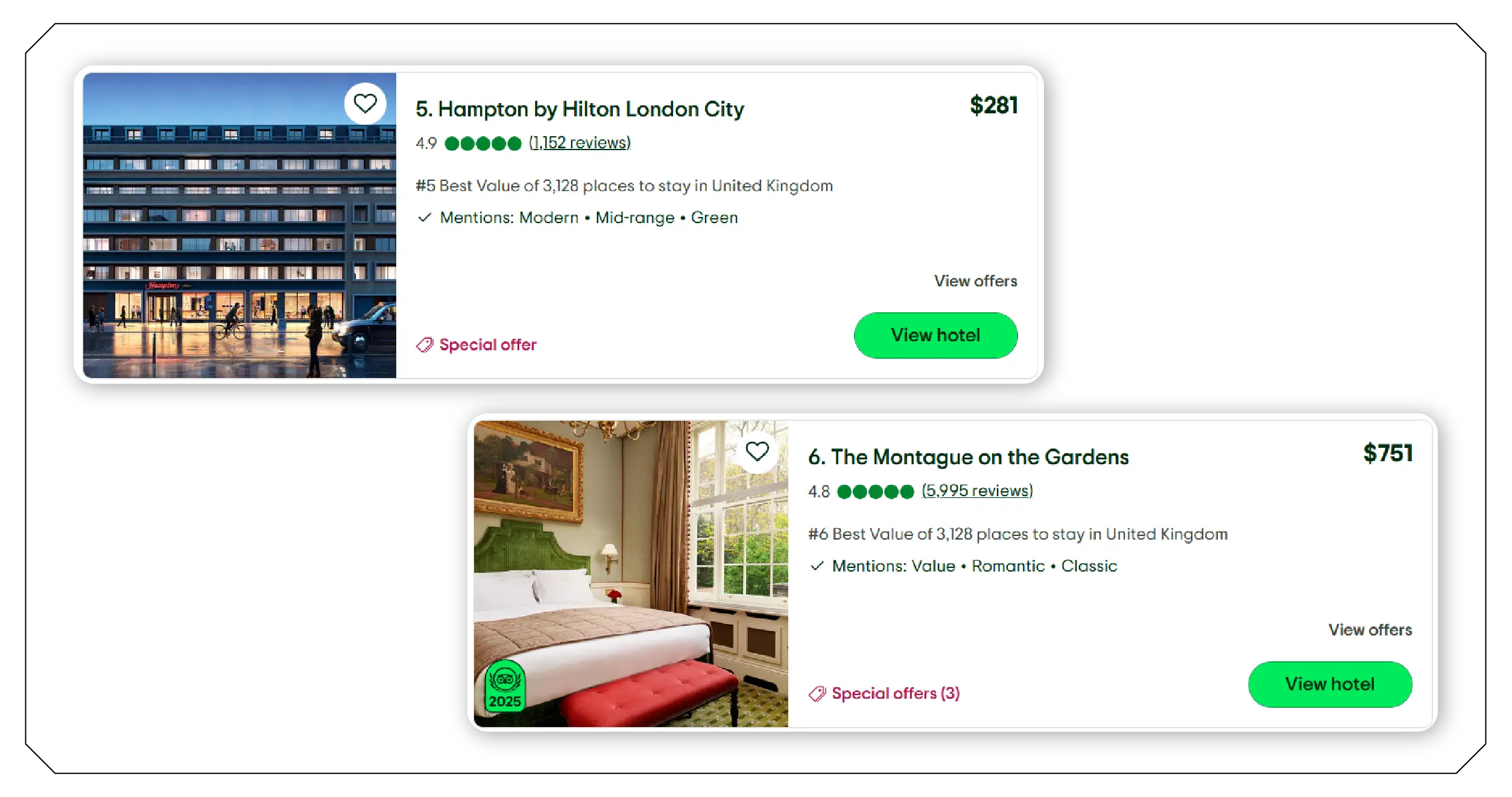What Are the Best Methods to Scrape TripAdvisor Hotel Data in UK Efficiently?

Introduction
In today’s highly competitive hospitality industry, having access to Scrape TripAdvisor Hotel Data in UK is no longer optional—it’s essential. TripAdvisor is one of the most trusted platforms for travelers worldwide, hosting millions of reviews, ratings, and booking details for hotels across the United Kingdom. For businesses that aim to maintain a competitive edge, understanding market trends, guest feedback, and pricing patterns is crucial. Leveraging Hotel Data Scraping Services allows hotels, travel agencies, and market analysts to systematically extract and analyze large volumes of structured and unstructured data, which otherwise would be impossible to process manually.
By scraping TripAdvisor, businesses can gain a strategic advantage. Whether it’s analyzing customer sentiment, monitoring competitor pricing, or predicting occupancy trends, TripAdvisor data serves as a rich resource for data-driven decision-making. In this blog, we will delve deep into the methods, benefits, tools, challenges, and best practices to Scrape TripAdvisor Hotel Data UK for Market Insights, showing how this information can be transformed into actionable business intelligence.
Why Scrape TripAdvisor Hotel Data UK for Market Insights?

TripAdvisor contains a wealth of information, from guest reviews to hotel listings and pricing. The ability to Scrape TripAdvisor Hotel Data UK for Market Insights is invaluable for understanding both the current market and long-term trends. Businesses can unlock insights that go beyond surface-level metrics, allowing for informed decision-making in areas such as pricing strategy, service improvement, and marketing campaigns.
Some key reasons for scraping TripAdvisor hotel data include:
- Competitor Analysis: Businesses can continuously monitor competitors’ offerings, seasonal promotions, and pricing models. This helps identify gaps in the market and potential opportunities. For example, if a competitor consistently receives high ratings for a particular service, hotels can adjust their offerings to remain competitive.
- Customer Experience Enhancement: Reviews and ratings provide a direct insight into guest satisfaction. By analyzing patterns in guest feedback, hotels can address common complaints, improve services, and enhance overall customer experience.
- Pricing Strategy Optimization: With access to competitor room rates and seasonal pricing, hotels can implement dynamic pricing strategies to maximize revenue. This is particularly important in high-demand tourist areas such as London, Edinburgh, or Bath.
- Market Demand Forecasting: Historical data on bookings and reviews can help predict future demand. This allows hotels to manage inventory, staffing, and pricing proactively rather than reactively.
- Marketing and Personalization: Scraped data can help design targeted marketing campaigns by identifying key demographics, frequently booked room types, and preferred services.
Overall, leveraging Hotel Data Intelligence from TripAdvisor allows businesses to stay ahead of competitors and make informed, data-driven decisions.
Understanding TripAdvisor Data Structure

Before scraping, it’s critical to understand the structure of TripAdvisor’s data. The platform contains multiple layers of information, each valuable for specific analytical purposes. By categorizing data, businesses can focus on extracting actionable metrics.
- Hotel Listings: These include the hotel name, address, star rating, amenities, and contact details. Analyzing hotel listings helps identify competitors, understand market saturation, and track hotel expansion or renovations.
- Room Rates: This includes prices for different room types, seasonal pricing variations, discounts, and promotional offers. Tracking rates over time provides insights into competitive pricing strategies and helps optimize revenue.
- Guest Reviews: TripAdvisor hosts millions of guest reviews, often detailing personal experiences, staff interactions, cleanliness, amenities, and overall satisfaction. Textual analysis can uncover sentiment trends, common complaints, and areas where hotels excel.
- Booking Details: Includes room availability, policies, cancellation rules, and booking trends. Tracking these details enables predictive analysis of high-demand periods and potential revenue spikes.
- Ratings and Scores: Overall scores, subcategory ratings (such as cleanliness, service, value), and review timestamps. These metrics help evaluate performance trends and customer loyalty over time.
With this understanding, businesses can systematically Scrape UK TripAdvisor Hotel Prices and Availability to collect relevant data points that drive strategic decisions.
Techniques for Web Scraping TripAdvisor Hotels Data
Web scraping is a systematic approach to extract large datasets from websites. Web Scraping TripAdvisor Hotels Data requires precision because TripAdvisor employs dynamic content loading, pagination, and anti-scraping mechanisms. There are several techniques to collect this data efficiently:
- HTML Parsing: Libraries like BeautifulSoup or lxml in Python allow developers to parse static HTML pages and extract hotel information. This technique is effective for structured sections like hotel listings, addresses, and star ratings.
- Browser Automation with Selenium: Many TripAdvisor pages load content dynamically using JavaScript. Selenium can automate browser actions, click buttons, navigate multiple pages, and extract real-time data for such dynamically loaded content.
- API-Based Extraction: If TripAdvisor provides access through APIs, using them is often more reliable than traditional scraping. APIs return structured datasets directly, minimizing errors and reducing legal risk.
- Data Cleaning and Transformation: Raw data from web pages often contains HTML tags, duplicated entries, and inconsistent formats. Using Python or R, scraped data can be cleaned, normalized, and transformed into structured datasets suitable for analysis.
- Data Storage: After extraction, data can be stored in databases like MySQL, PostgreSQL, or NoSQL options like MongoDB for easy querying and analytics.
Using these techniques ensures accurate and comprehensive data capture, enabling businesses to Extract Real-Time TripAdvisor Hotel Ratings UK for immediate analysis and action.
Benefits of Scraping TripAdvisor Hotel Data

- Real-Time Market Insights
Hotels can monitor real-time trends in guest preferences, competitor pricing, and service ratings. The method to Extract Real-Time TripAdvisor Hotel Ratings UK allows hotel management to quickly identify shifts in customer sentiment and address concerns proactively, ensuring a positive reputation. - Enhanced Pricing Strategies
By collecting data on competitors’ room rates and discounts, hotels can implement dynamic pricing models. This approach ensures that rates are competitive while maximizing revenue. Seasonal pricing, weekend surcharges, and peak-time discounts can all be optimized using historical data. - Comprehensive Guest Feedback Analysis
Scraping TripAdvisor UK Hotel Reviews and Booking Data helps hotels identify recurring issues or service gaps. Natural language processing and sentiment analysis tools can categorize reviews as positive, negative, or neutral, offering actionable insights for operational improvements. - Predictive Demand Analysis
Scraped data enables the creation of predictive models for room occupancy. Understanding high-demand periods, customer booking patterns, and seasonal travel trends allows hotels to plan staffing, marketing campaigns, and promotions effectively. - Competitive Benchmarking
By comparing performance metrics with other hotels in the same region, businesses can benchmark their services, amenities, and pricing. This helps identify competitive advantages and areas requiring improvement, ultimately guiding strategic decisions.
Building a TripAdvisor Guest Reviews Dataset
Creating a structured TripAdvisor Guest Reviews Dataset is essential for detailed analysis. This dataset typically includes:
- Hotel Name & Location
- Star Rating & Review Score
- Guest Review Text
- Review Date & Time
- Room Types & Prices
- Booking Patterns and Seasonal Trends
Once structured, this dataset can be analyzed using dashboards, predictive models, or advanced business intelligence tools. Hotels can identify trends in guest satisfaction, correlate pricing with occupancy, and create targeted marketing campaigns. Such datasets also facilitate trend forecasting, allowing businesses to stay ahead of market changes.
Leveraging Hotel Data Intelligence
Hotel data intelligence transforms raw data into actionable business insights. With the help of analytics, predictive modeling, and visualization tools, hotels can:
- Predict Occupancy and Demand: Using historical bookings and reviews, predictive models can forecast high-demand periods, enabling better inventory management.
- Revenue Management: Dynamic pricing strategies optimize revenue by adjusting room rates based on real-time market conditions.
- Sentiment-Driven Marketing: Marketing campaigns can be personalized based on the sentiment and preferences extracted from guest reviews.
- Operational Optimization: Identifying recurring service issues helps prioritize operational improvements and staff training.
Through Hotel Data Intelligence, businesses gain the ability to make informed strategic decisions, enhancing customer satisfaction and profitability.
Legal and Ethical Considerations
While scraping TripAdvisor data provides tremendous benefits, it must be done ethically and legally. Violating the platform’s terms of service or data privacy regulations can have serious consequences. Best practices include:
- Avoid sending excessive requests that could overload servers.
- Use official APIs whenever possible for structured access.
- Respect user privacy and anonymize personal data.
- Ensure compliance with GDPR and other local data protection regulations.
By following these guidelines, companies can extract valuable insights while maintaining compliance and ethical standards.
Tools and Technologies for Scraping TripAdvisor Hotel Data
Effective scraping requires the right combination of tools and technologies. Commonly used options include:
- Python Libraries: BeautifulSoup, Selenium, Scrapy, and Requests for extraction.
- Data Storage: SQL and NoSQL databases to store structured data.
- Analytics Tools: Pandas, NumPy, and Power BI for data analysis and visualization.
- Cloud Platforms: AWS, GCP, or Azure for scalable storage and processing of large datasets.
By leveraging these tools, businesses can automate Scrape UK TripAdvisor Hotel Prices and Availability, clean data efficiently, and perform analytics for strategic decision-making.
Use Cases Across the Hospitality Industry
Hotels and Chains
Hotels can monitor competitors’ pricing, track customer reviews, and optimize
operational efficiency based on insights drawn from TripAdvisor data.
Travel Agencies
Travel agencies can utilize guest reviews and availability data to provide personalized
recommendations and offer curated packages to travelers.
Market Analysts
Analysts can study market trends, detect shifts in travel behavior, and forecast
occupancy patterns for better investment and operational decisions.
Online Booking Platforms
Integrating scraped TripAdvisor data enhances platform offerings with real-time reviews,
ratings, and room availability, improving customer experience.
Challenges in Scraping TripAdvisor Data
While the advantages are significant, scraping TripAdvisor presents challenges:
- Dynamic Content Loading: Many reviews and ratings load asynchronously, requiring advanced scraping methods.
- IP Blocking & Rate Limiting: Excessive scraping requests may trigger blocks or CAPTCHAs.
- Large Data Volume: Storing, cleaning, and analyzing massive datasets can be resource-intensive.
- Data Accuracy: Ensuring that extracted data is reliable and consistent over time is crucial.
These challenges demand technical expertise and strategic planning to maintain effective and continuous scraping operations.
Best Practices for Effective Data Scraping
- Focus on Structured Data: Identify key metrics such as ratings, reviews, and pricing to extract actionable insights.
- Automate Processes: Use scripts, crawlers, and APIs to reduce manual effort and improve consistency.
- Maintain Fresh Data: Regularly update datasets to reflect real-time market dynamics.
- Clean and Validate Data: Remove duplicates, normalize formats, and ensure accuracy.
- Respect Legal and Ethical Standards: Always adhere to TripAdvisor’s terms of service and privacy regulations.
Following these practices ensures that businesses extract the highest value from TripAdvisor data while minimizing risks.
Transforming Scraped Data into Business Value
Once the data is collected and structured, it can be used to derive insights that drive strategic decisions:
- Price Optimization Models: Use historical pricing and competitor rates to determine optimal room rates.
- Sentiment Analysis: Categorize guest reviews to gauge satisfaction levels and identify common complaints.
- Trend Forecasting: Predict high-demand periods and seasonal travel patterns for better planning.
- Competitive Benchmarking: Compare hotel performance against regional averages to identify strengths and weaknesses.
This transformation of raw data into actionable Hotel Data Intelligence enables smarter decision-making, operational efficiency, and improved revenue management.
Conclusion: Strategic Advantages of TripAdvisor Data Scraping
In conclusion, Web Scraping TripAdvisor Hotels Data in the UK offers a strategic advantage for hotels, travel agencies, and analysts seeking actionable insights. Leveraging TripAdvisor data enables businesses to:
- Monitor guest reviews and room rates for immediate market insight.
- Implement dynamic pricing strategies to maximize revenue.
- Forecast occupancy trends and adapt services proactively.
With the right tools and practices, businesses can Extract TripAdvisor Hotel Listings UK via API. They can also build a comprehensive TripAdvisor Hotel Room Rates Dataset. This approach positions companies to thrive in a highly competitive market, delivering superior guest experiences while maximizing profitability.
Ready to elevate your travel business with cutting-edge data insights? Scrape Aggregated Flight Fares to identify competitive rates and optimize your revenue strategies efficiently. Discover emerging opportunities with tools to Extract Travel Website Data, leveraging comprehensive data to forecast market shifts and enhance your service offerings. Real-Time Travel App Data Scraping Services helps stay ahead of competitors, gaining instant insights into bookings, promotions, and customer behavior across multiple platforms. Get in touch with Travel Scrape today to explore how our end-to-end data solutions can uncover new revenue streams, enhance your offerings, and strengthen your competitive edge in the travel market.